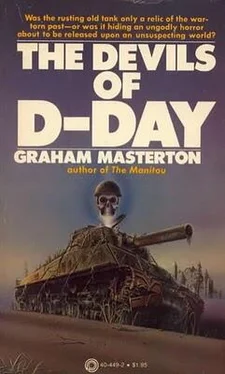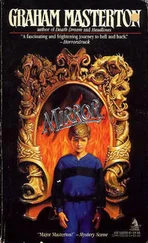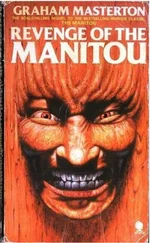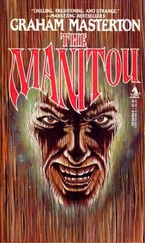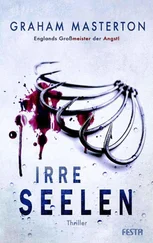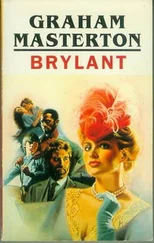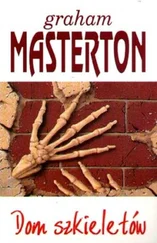“The dismissal of demons? What the hell’s that?”
Madeleine touched her forehead. “The words of exorcism. Mother always believed in devils and demons, and she has the words in one of her holy books.”
“Well, what happened?”
Madeleine slowly shook her head. “She was only a simple woman. She was kind and she was loving and she believed deeply in God and the Virgin Mary. Yet her religion couldn’t save her. Thirteen days after she sprinkled the holy water on the tank, she started to cough blood, and she died in hospital in Caen after a week. The doctors said she had some form of tuberculosis, but they could never say precisely what form it was, or why she had died so quickly.”
I felt embarrassed now, as well as afraid. “I’m sorry.” Madeleine looked up, and there was that wry smile again. “You have no need to be. But you can see why I’d rather you didn’t go near the tank.”
I thought for a while. It would be easy enough to forget the tank altogether, or simply add a footnote to Roger’s book that the last remaining Sherman tank of a secret special division was still decaying in the Norman countryside, and that local yokels believed it was possessed by evil. But how can you dismiss something like that as a footnote? I didn’t particularly believe in demons and devils, but here was a whole French village that was scared half to death, and a girl seriously claiming that malevolent spirits had deliberately killed her mother.
I pushed back my chair and stood up. I’m sorry,” I said, “but I’m still going to take a look. If it’s true, what you said about your mother, then we’ve got the biggest supernatural story here since Uri Geller.”
“Uri Geller?” she frowned.
I coughed. “He, er, bends spoons.” She sat at the table looking a little sad. Then she said: “Well, if you insist on going, I’ll have to come with you. I don’t want you to go on your own.”
“Madeleine, if it’s really that dangerous—”
“I’ll come with you, Dan,” she repeated firmly, and all I could do was lift my hands in acceptance. I was glad of the company anyway.
While I turned the 2CV around in the yard, Madeleine went to get her overcoat. The clouds were beginning to clear a little, and there was a washed-out moon up above us like a white-faced boy peering through a dirty window. Madeleine crossed the yard, climbed into the car, and we bounced off across the ruts and the puddles until we reached the road. Just before we turned, Madeleine reached over and squeezed my hand. “I would like to say good luck,” she whispered.
“Thanks,” I told her. “And the same to you”
It took us two or three minutes to reach the hedge where the tank lay entangled. As soon as I saw the shape of it, I pulled the Citröen over on to the opposite verge, and killed the motor. I lifted my battery-operated tape recorder out of the back seat, and opened the car door.
Madeleine said, “I’ll wait here. Just for the moment, anyway. Call me if you need me.”
“Okay.”
Down here by the river, under the brow of the cliffs, the pallid moonlight barely reached. I crossed the road and stepped right up to the tank, touching its cold corroded mudguard. It seemed so dead and desolate and rusted that, now I saw it again for real, it was hard to believe that there was anything supernatural about it. It was nothing more than the abandoned junk of war.
There was a rustling sound in the grass around the tracks, and I froze. But then a rabbit jumped out from underneath the tank, and scampered off into the hedge. It was kind of late in the year for rabbits, but I guess they could have made their nest inside the tank itself, or underneath it somewhere. Maybe that was the real answer to Pont D’Ouilly’s haunted relic—squeaking and rustling wildlife.
I walked round the tank as far as I could, but its right side was completely tangled in brambles, and it would have taken a sharp machete and three native bearers to go round and take a good look at that. I satisfied myself with the left side and the back. I was interested to see that even the air vents for the engine had been welded up tight, and so had the grille over the driver’s porthole.
Slinging my tape recorder over my shoulder, I heaved myself up on to the tank’s mudguard. I made a lot of noise doing it, but I didn’t suppose that thirty-year-old ghosts really objected that much to being disturbed in the night. Carefully, I walked across the blackened hull, and my footsteps sounded booming and metallic. I reached the turret, and hammered on it with my fist. It sounded very empty in there. I hoped it was.
As Jacques Passerelle had said, the tank’s hatch was welded shut. It was a hasty-looking weld, but whoever had done it had known his job. As I strained forward to look at it more closely, however, I saw that the hatch was sealed by other means as well—means that, in their own way, were just as powerful.
Riveted over the top of the tank was a crucifix. It looked as if it had been taken from the altar of a church and crudely fastened to the turret in such a way that nobody could ever remove it. Looking even nearer, I saw that there was some kind of holy adjuration, too, engraved in the rough metal. Most of the words were corroded beyond legibility, but I could distinctly make out the phrase Thou art commanded to go out.
Up there on the hull of that silent ruined tank, in the dead of winter in Normandy, I felt frightened of the unknown for the first time in my life. I mean, really frightened. Even though I didn’t want it to, my scalp kept chilling and prickling, and I found I was licking my lips again and again like a man in an icy desert. I could see the Citröen across the road, but the moon was reflecting from the flat windshield, so I couldn’t make out Madeleine at all. For all I knew, she might have vanished. For all I knew, the whole of the rest of the world might have vanished. I coughed in the bitter cold.
I walked along to the front of the tank, pushing aside wild brambles and leafless creeper. There wasn’t much to see there, so I walked back again to the turret, to see if I could distinguish more of the words.
It was then, as my fingers touched the top of the turret, that I heard someone laughing. I stayed stock still, holding my breath. The laughter stopped. I lifted my head, and tried to work out where the sound might have come from. It had been a short, ironic laugh, but with a peculiarly metallic quality, as if someone had been laughing over a microphone.
I said, “Who’s there?” but there was silence. The night was so quiet that I could still hear that distant dog barking. I laid my tape-recorder on top of the turret and clicked it on.
For several minutes, there was nothing but the hiss of the tape coursing past the recording head, and that damned dog. But then I heard a whispering sound, as if someone was talking to himself under his breath. It was close, and yet it seemed far away at the same time. It was coming from the turret.
Shaking and sweating, I knelt down beside the turret and tapped on it, twice. I sounded as choked up as a grade school kid after his first dry martini. I said, “Who’s there? Is there anybody inside there?”
There was a pause, and then I heard a whispery voice say, “ You can help me, you know. ”
It was a strange voice, which seemed to come from everywhere at once. It seemed to have a smile in it as well—the kind of voice that someone has when they’re secretly grinning. It could have been a man or a woman or even a child, but I wasn’t sure.
I said, “Are you in there? Are you inside the tank?”
The voice whispered, “ You sound like a good man. A good man and true. ”
Almost screaming, I said, “What are you doing in there? How did you get in?”
Читать дальше
